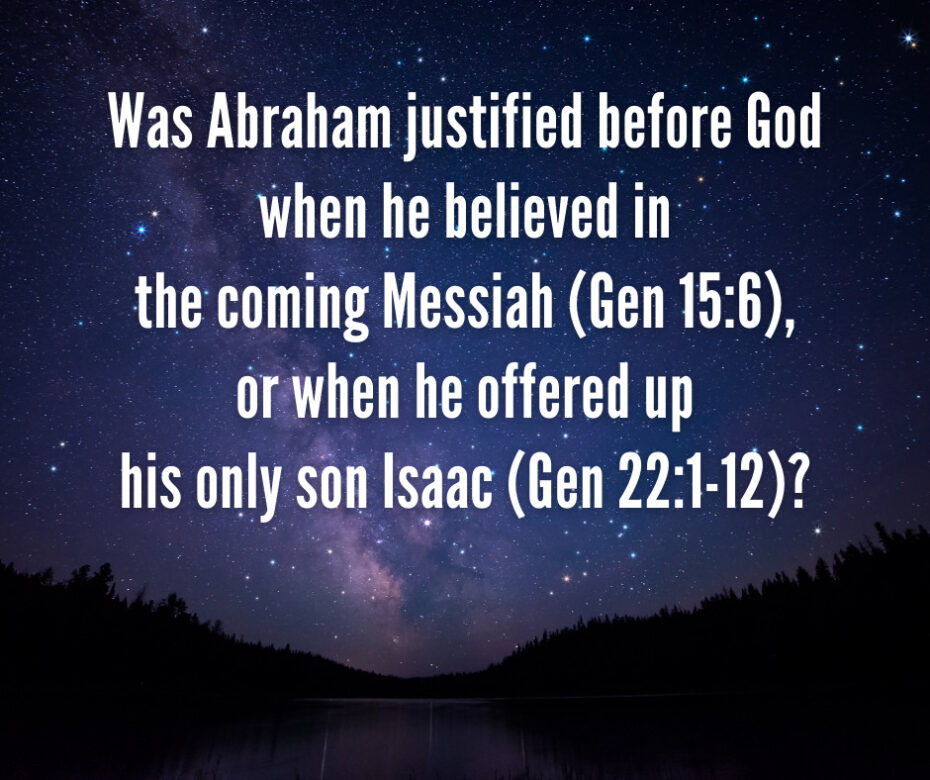D. C. wonders:
I believe many understand the context of Jas 2:21-24 to be a type of justification before men and not God.i My problem has always been in v 22 when it says that by Abraham’s actions, his faith was made complete (or perfected), and then v 23 says the Scripture was fulfilled talking about Abraham’s initial faith in Gen 15:6. This seemingly ties together Abraham’s initial faith with his actions in offering Isaac and the concept that his faith wasn’t complete until then, which has bothered me.
I am unable to pull it all together in a satisfactory way for myself…
What is confusing D. C. is the connection in Jas 2:22 of faith and works. Let’s see if I can help clear this up.
When Abraham offered up Isaac, his initial faith in the coming Messiah (Gen 15:1-6) was perfected or matured. Hodges comments, “Abraham had confidence that the God in whom he believed could overcome the deadness of his own body and of Sarah’s womb. But it was only through the testing with Isaac that this implicit faith in God’s resurrection power becomes a specific conviction that God could literally raise a person physically from the dead to fulfill His oath” (James, p. 68). He continues, “Thus the faith of Abraham was strengthened and matured by works!…In the process of carrying out the divine command to sacrifice his beloved boy, his faith grew and reached new heights of confidence in God” (p. 68).
Every believer should always apply what we believe. That is the point of Jas 2:14-26. If we believe something in God’s Word and yet do not apply it, our faith is dead, unprofitable. But when we apply what we believe, then our faith is active and profitable.
Let’s say you believe it is more blessed to give than receive. Thus, when you see someone in your church in need, your faith is brought to maturity if you bless by giving. But if you close your heart and do not give to the brother in need, then your faith was dead, that is, unproductive. See Jas 2:15-16 that gives that specific example.
James is clear, of course, that one is born again by faith in Christ, apart from works (Jas 1:18). But our initial faith should grow as we come to understand and believe more and more of what God says. Our mindset should become Christlike (1 Cor 2:16). Our initial faith in Christ has potential to open up into a lifetime of good works. Some of those good works may be directly or indirectly related to believing in Jesus for everlasting life. But most of those good works are related to discipleship truths that we come to believe. Of course, even those discipleship truths grow out of a proper understanding of the promise of life. That is why it is tragic that so many people believe in salvation by faith plus works. Many think that faith plus works saves us from eternal condemnation. That is the thinking of the Pharisees and the Judaizers. That thinking does not result in justification or sanctification. We are saved by faith alone in Christ alone. But we are sanctified as we please God by applying God’s Word in our daily living. The latter can and should grow out of the former. But we need to keep them separate, or we end up believing a false gospel.
The Free Grace position is not opposed to our faith being brought to maturity by our works. Indeed, the FG position emphasizes the Judgment Seat of Christ and the importance of pleasing the Lord Jesus by the deeds that we do (2 Cor 5:9-10).
__________
i James 2:23a refers to Abraham’s justification before God. But James 2:21 looks at his justification before men, and James 2:24 looks at both his justifications: by works before men and also by faith before God.


